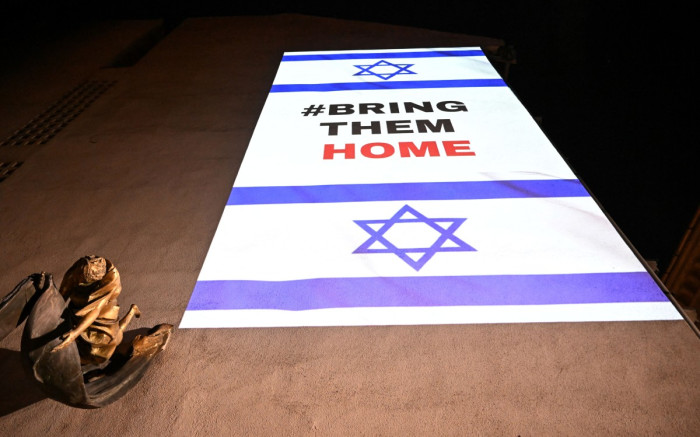
- Attacks by Iranian proxy groups are increasing
- The US has stepped up its retaliatory strikes
- There are fears that the conflict could escalate into a larger war
FILE – The guided-missile destroyer USS Carney in Souda Bay, Greece. The American warship and several merchant vessels were attacked in the Red Sea on Sunday, December 3, 2023, the Pentagon said, potentially marking a significant escalation in a series of naval attacks in the Middle East related to the Israel-Hamas war. “We are aware of reports of attacks on the USS Carney and merchant vessels in the Red Sea and will provide information as it becomes available,” the Pentagon said. (Petty Officer 3rd Class Bill Dodge/US Navy via AP)
(NewsNation) – Recent attacks in the Middle East have prompted retaliation from the United States and other countries in what a former CIA officer described as a “powder keg.”
“In my opinion, this is one of the worst (times) I have ever seen in terms of instability in the Middle East,” said Tracy Walder, national security correspondent for NewsNation.
Where did the attacks take place?
After October 7 Hamas attack In Israel, violence and conflict in the region are increasing. Hezbollah fighters in Lebanon were also there Integration of Israel on the country’s northern border, fueling fears of a multi-front war.
It was Houthi fighters from Yemen Start strikes on military and commercial vessels in the Red Sea, causing potential supply chain problems as major shipping companies reroute their ships around Africa instead. Although this route is safer, it is longer and more expensive.
Most recently Iran launched airstrikes in Pakistan, it targets a Sunni militant group. Iran has also launched attacks on targets in Syria and Iraq.
Who is behind the attacks?
The attacks were carried out by a number of militant groups and the Iranian government.
HamasGaza’s ruling body, has been engaged in attacks against Israel for years, in what it sees as resistance to Israel’s apartheid-like policies and the 16-year blockade of the Gaza Strip.
In Lebanon, Hezbollah is a militant group primarily dedicated to fighting Israel and opposing the country’s occupation of southern Lebanon, which ended in 2000.
The Houthis are a Shiite militia group that staged a coup in Yemen, seizing control of the capital Sanaa and large parts of northern Yemen. Although the group exercises significant control over the country, the international community does not recognize it and instead recognizes the Yemeni government-in-exile.
Are these attacks related?
The red thread Iran stands out among all terrorist groups. Iran has supported Hezbollah, Hamas and the Houthis, as well as other Shiite militia groups in the region.
“This is not a series of unrelated conflicts. The puppet master here is the regime in Iran,” said former national security adviser John Bolton.
This includes funding, training, weapons and occasionally direct involvement in operations. There is no indication that Iran has done this directly involved in the Oct. 7 attacks, but it likely trained fighters and provided the weapons used in the attack.
“Iran helped plan and Iran helped finance many of the events of October 7th,” Walder said. “The infrastructure, the weapons, everything came from somewhere. And I firmly believe that this is Iran.”
What is Iran’s goal?
Iran’s goal is to destabilize the region as part of efforts to normalize relations with Israel, including the agreement by Saudi Arabia and the United Arab Emirates to recognize Israel as a country. Tehran has long used proxy groups against Israel and other opponents in the region.
The country aims to become the dominant power in the region and also wants to be a nuclear power.
“They want to win in this nuclear race, so to speak, and Pakistan has established itself as a nuclear power. “Not Iran,” Walder said.
Iran is also struggling with domestic unrest and the impact of long-term sanctions that have hurt the economy.
Did the USA or other countries react?
The USA has renamed the Houthis as a terrorist organization and Sanctions used against various militant groups in the region and in Iran.
The US and its allies did it too military actions were increasingly used To retaliate against the Houthis, they are increasing their attacks as the Red Sea attacks have been going on for some time try to avoid allow the conflict to escalate further.
Pakistan too Retaliated against Iran with air strikes around the country’s borders.
Could this lead to a regional war?
There was fear of one larger regional conflict since Israel declared war on Hamas, especially if Iran were directly involved.
As attacks by proxy groups and Iran itself continue, U.S. retaliation is becoming increasingly severe. If that Kind of escalation If the conflict persists, it could escalate into a much broader regional war.
“I’m not normally an alarmist,” Walder said. “But I’m very worried.”






Recent Comments